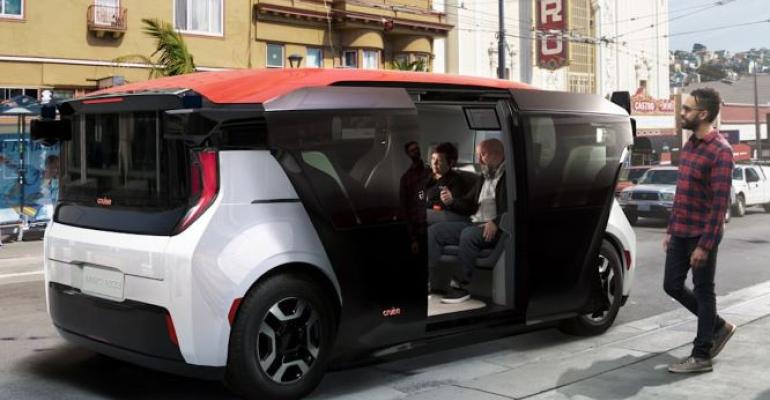DETROIT – General Motors Chair and CEO Mary Barra says she is satisfied the automaker’s support for its self-driving subsidiary, Cruise, will pay dividends.
“We’re in an industry that is completely transforming,” she says during a meeting with members of the Automotive Press Assn. here.
Cruise is successfully offering rides to customers without safety drivers in San Francisco. GM will begin building the first dedicated, driverless autonomous vehicle, the Cruise Origin, next year at the company’s Factory Zero in Detroit, Barra says.
Other automakers, notably Ford and Volkswagen, have shelved plans for AVs, saying the technology to support fully autonomous driving safely is not ready yet. Google’s parent company, Alphabet, is under pressure from investors to scale back its commitments to Waymo, its self-driving unit, which has spent years in development.
Barra (pictured, below left) says GM is convinced it can expand Cruise to a point where it is pulling in as much as $1 billion annually by the middle of the decade and up to $50 billion annually by 2030. Cruise, in which GM has invested $2 billion, had a staff of 40 in 2016, when GM acquired the company, and has 3,000 people today.
 “We’re in the lead position right now” in terms of autonomous-vehicle development, she says.
“We’re in the lead position right now” in terms of autonomous-vehicle development, she says.
Cruise is benefiting from drawing on GM’s expertise in automotive engineering, Barra says, noting GM has restructured its engineering teams to put more emphasis on software development.
“I think the U.S. needs to lead in key technologies such as batteries and autonomous vehicles,” she says.
GM supports the Inflation Reduction Act signed into law in August, but Barra notes the Treasury Dept. is still drafting the rules covering the Act’s complex tax credits. The act as written does not necessarily favor American companies, but “favors companies that invest in America,” she says. “lf we drive more investment in this country, it will achieve a lot of the administration’s goals.”
The semiconductor shortages that have curtailed GM’s production over the past couple of years have helped give the automaker greater insight into shaping its relationship with suppliers of critical materials for the batteries needed to support the company’s push into electric vehicles, Barra says.
Those suppliers are aware affordability is a major issue for EVs and know they must control costs so EV demand can grow, she says.
“No one really knows which way the economy is going,” Barra says. “We’re setting our budgets to be very conservative on a constant basis. But we don’t want to be so cautious (that) we can’t take care of opportunities.”
The CEO is confident GM will reach an equitable contract settlement next year with the United Auto Workers and Unifor, the union representing Canadian auto workers. Barra says she has already met with Lana Payne, Unifor’s new president, but must wait for the completion of UAW’s leadership elections, which will determine that union’s next president. “We don’t know who we’re going to be meeting with yet,” she says.
However, Barra knows hourly employees “want to be recognized for their efforts and they want to feel they have a career with GM,” she says, adding blue-collar employees deserve credit for boosting the quality of GM’s products during the pandemic when product quality generally declined across the industry. “Being appropriately compensated is also important.”
Barra also says she operates as GM’s “chief diversity officer” and wants to build a culture inside GM where people feel included as part of the team. “I know. It’s terrible to feel excluded,” says Barra, who began her career with the automaker as an 18-year-old cooperative student at General Motors Institute (now Kettering University) in Flint, MI.
Barra, who began her career at GM 42 years ago and became CEO nine years ago, suggests she isn’t ready to retire. “I will be here as long as the board wants me to be,” she says. “This is the most exciting time.”





